五年级下册英语复习资料
五年级下册英语知识点归纳整理总结
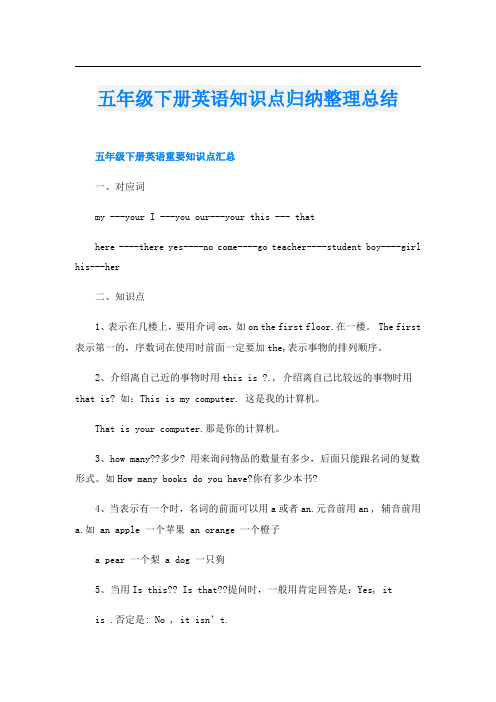
五年级下册英语知识点归纳整理总结五年级下册英语重要知识点汇总一、对应词my ---your I ---you our---your this --- thathere ----there yes----no come----go teacher----student boy----girl his---her二、知识点1、表示在几楼上,要用介词on,如on the first floor.在一楼。
The first 表示第一的,序数词在使用时前面一定要加the,表示事物的排列顺序。
2、介绍离自己近的事物时用this is ?., 介绍离自己比较远的事物时用that is? 如:This is my computer. 这是我的计算机。
That is your computer.那是你的计算机。
3、how many??多少? 用来询问物品的数量有多少,后面只能跟名词的复数形式。
如How many books do you have?你有多少本书?4、当表示有一个时,名词的前面可以用a或者an.元音前用an , 辅音前用a.如 an apple 一个苹果 an orange 一个橙子a pear 一个梨 a dog 一只狗5、当用Is this?? Is that??提问时,一般用肯定回答是:Yes, itis .否定是: No , it isn’t.三、句子:1、This is the teacher’s office.这是老师办公室。
2、That is my classroom.那是我的教室。
3、Go to the library. Read a story-book..去图书馆。
读故事书。
4、Is this the library? Yes, it is.这是图书馆吗?是的。
5Is that the art room? The art room is on the second floor.那是美术室吗?不是,美术室在二楼。
小学英语五年级下册各个单元复习资料

小学英语五年级下册各个单元复习资料第一单元:At the zoo单词复习•lion(狮子)•elephant(大象)•giraffe(长颈鹿)•monkey(猴子)•tiger(老虎)•panda(熊猫)•kangaroo(袋鼠)•snake(蛇)•zebra(斑马)•crocodile(鳄鱼)句子复习1.I see a lion at the zoo.(我在动物园看到一只狮子。
)2.The elephant is big.(这只大象很大。
)3.Look at the giraffe’s long neck.(看看长颈鹿的长脖子。
)4.The monkey can climb trees.(猴子会爬树。
)5.The tiger is sleeping.(老虎在睡觉。
)6.The panda eats bamboo.(熊猫吃竹子。
)7.Kangaroos have long tails.(袋鼠有长尾巴。
)8.The snake is slithering.(蛇在蠕动。
)9.Zebras have black and white stripes.(斑马有黑白相间的条纹。
)10.Be careful, the crocodile is dangerous.(小心,鳄鱼很危险。
)第二单元:In the city单词复习•street(街道)•building(建筑物)•park(公园)•bank(银行)•supermarket(超市)•hospital(医院)•restaurant(餐厅)•museum(博物馆)•library(图书馆)•cinema(电影院)•police station(警察局)句子复习1.I live on a busy street.(我住在一条繁忙的街道上。
)2.The tall building is the post office.(那座高楼是邮局。
)3.Let’s go to the park and play.(我们去公园玩吧。
PEP五年级英语下册总复习资料(完整版)

PEP五年级下册完整Unit 1 My Daydo morning exercises晨练eat breakfast吃早饭have english class上英语课play sports进行体育运动eat dinner吃晚饭when什么时候evening夜晚;晚上get up起床at在……点钟usually通常;一般noon中午climb mountains爬山go shopping购物;买东西play the piano弹钢琴visit grandparents看望祖父母go hiking去远足weekend周末often经常sometimes有时候话题1:日常生活时态:一般现在时1.When do you do morning exercises? 你什么时候做早操?I usually do morning exercises at 8:00. 我经常八点钟做早操。
(I usually get up at 12:00 at noon . 我经常在中午十二点起床。
) 2.When do you eat dinner ? 你什么时候吃晚餐?I eat dinner at 7:00 in the evening. 我在晚上七点种吃晚餐。
3.When is the best time to go to Beijing? Fall. 最好在什么时候去北京?秋天。
Unit 2 My Favourite Seasonspring春天summer夏天fall秋天winter冬天season季节which哪一个best最;极swim游泳fly kites放风筝skate滑冰make a snowman堆雪人plant trees种树why为什么because因为sleep睡觉话题2:季节时态:一般现在时1.Which season do you like best ? I like spring best.(Spring.)你最喜欢是什么季节?我最喜欢春季。
五年级下册英语期末复习知识点

1一、词汇类1.季节词season (4个) spring 春天 summer 夏天 autumn 秋天 winter 冬天2.月份名称 (month 12个)March (Mar.)三月 April (Apr.)四月 May 五月June 六月 July 七月 August (Aug.)八月September(Sept.)九月 October(Oct.)十月 November (Nov.) 十一月December(Dec.)十二月 January(Jan.)一月 February(Feb.)二月3.序数词 (10个).first(1st) 第一(的) second (2nd)第二(的) third (3rd)第三(的)fourth (4th)第四(的) fifth(5th)第五(的) twelfth(12th)第十二(的)twentieth(20th)第二十(的) twentieth-first(21st)第二十一(的)twentieth-third(23rd)第二十三(的) thirtieth(30th)第三十(的)4.节日名称 ( 16个)New Year ’s Day 元旦() Women ’s day 妇女节()Tree-planting Day 植树节() April Fool ’s Day 愚人节()Easter 复活节 () May Day 劳动节()Dragon boat Festival 端午节(农历五月初五)Mother ’ s Day 母亲节(五月的第二个星期)Father ’ s Day 父亲节(六月的第三个星期天)Children ’s Day 儿童节() Army Day 建军节()Teachers ’ Day 教师节() Christmas 圣诞节()Mid-autumn Festival 中秋节(农历八月十五)China ’s National Day 国庆节()Thanksgiving Day 感恩节(11月第4个周四)形代(后面加名词) 名代(后面不加名词6.动词短语42个eat breakfast 吃早饭 wash my face 洗脸 read books 读书eat lunch 吃午饭 wash my clothes 洗我的衣服 drink water 喝水eat dinner 吃晚饭 watch TV 看视 listen to music 听音乐go to bed 上床睡觉 clean my room 打扫我的房间 eat ice cream 吃冰激go for a walk 散步 go on a picnic 去野餐 go to the beach 去沙滩play ping-pong 打乒乓球 play football 踢足球 play basketball 打篮球play sports 进行体育运动 play the pipa 弹琵琶 play with each other 一起玩耍go swimming 去游泳 go shopping 去购物 go hiking 去远足go skating 去滑冰 go running 去跑步 go boating 去划船go fishing 去钓鱼 pick apples 摘苹果 fly kites 放风筝do homework 做作业 do morning exercises 做早操 do kung fu 练武术have···class 上····课 take a dancing class 上舞蹈课pick apples 摘苹果 make a snowman 堆雪人 plant trees/flowersclimb trees 爬树 climb mountains 爬山 play in the snow 在雪里玩play with snow 玩雪7.活动名称 8个sports meet 运动会 Easter party 复活节聚会 school trip 学校旅行Chinese test 语文测试 singing contest 歌咏比赛 birthday party 生日聚会summer vacation 暑假 winter vacation 寒假8语音词汇 46个cl /kl/ clean打扫 clock钟表 class 班级 clever 聪明的pl /pl / plate 盘子 eggplant 茄子 please请 play 玩打br /br/ brown棕色的 ibrary 图书馆 brother 兄弟 umbrella 雨伞gr /gr/ green 绿色的 grapes葡萄 grandpa 爷爷 grow 生长ch/ ʧ/ China 中国 chicken 小鸡 lunch午餐 teacher 教师ch /k/ school 学校 Christmas 圣诞sh /ʃ/ sheep 绵羊 fish 鱼 shirt 衬衫 shorts 短裤th /θ / three 三 thin 瘦的 thirteen 十三 maths 数学th / ð/ this这个 that那个 mother 妈妈 brother 兄弟ng / ŋ/ long 长的 sing 唱 ring 铃响 young 年轻的nk / ŋk/ think想 ink墨水 trunk象鼻 pink粉色wh字母组合在o前发/h/ 其他的发/w/wh /w/ what什么 when 什么时候 where哪里 white 白的wh / h/ whose谁的 who 谁 whole完整的9. 频度副词always总是,(100%) usually通常(80%)often 经常(60%) sometimes有时(30%)10.天气的形容词:hot 炎热的 warm 暖和的 cool凉爽的 cold 寒冷的sunny晴朗的 cloudy 多云的 windy 多风的 rainy多雨的 snowy下雪的10.熟记标志语:Keep to the right 靠右 Keep your desk clean 保持桌子干净Talk quietly\ Quiet, please 请小点声Take turns 按顺序来Work quietly 安静学习 No eating 禁止吃东西二.语法知识点1.介词in . on. at的用法。
冀教版五年级下册英语全册复习资料
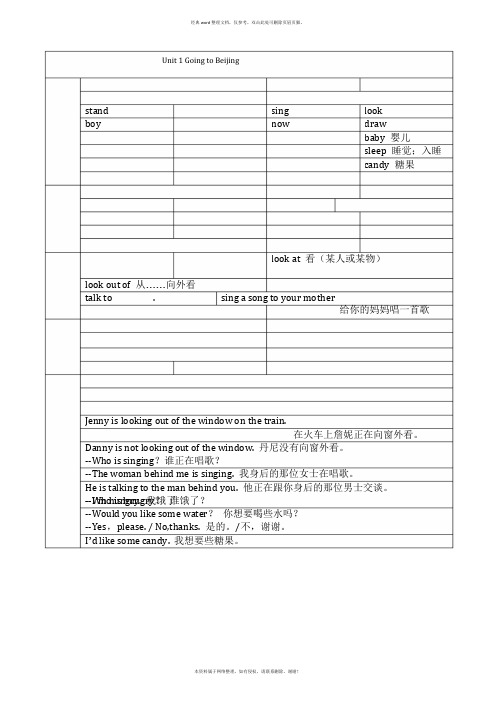
Unit 1 Going to Beijingstand boy singnowlookdrawbaby 婴儿sleep 睡觉;入睡candy 糖果look at 看(某人或某物)look out of 从……向外看talk to . sing a song to your mother给你的妈妈唱一首歌Jenny is looking out of the window on the train.在火车上詹妮正在向窗外看。
Danny is not looking out of the window. 丹尼没有向窗外看。
--Who is singing?谁正在唱歌?--The woman behind me is singing. 我身后的那位女士在唱歌。
He is talking to the man behind you. 他正在跟你身后的那位男士交谈。
--Who is hungry?谁饿了?--I’m hungry. 我饿了--Would you like some water?你想要喝些水吗?--Yes,please. / No,thanks. 是的。
/不,谢谢。
I’d like some candy. 我想要些糖果。
people 人们busy 忙碌的many 许多的;许child 孩子(复数形式为children)多women 女人(woman 的复数形式)take乘坐;买下;拍照be 是;存在(am,is,are 等的原形动词)feel 觉得;感到tired 疲劳的;累的stop 停下,停止(公共汽车、火车)站afraid 害怕,畏惧for 为……,给……difficult 困难的football 足球Well 健康,噢take a picture 拍照be afraid 害怕far from…离…远take a bus 乘公交车stand beside Jenny 站在詹妮旁边so busy 如此忙碌how old 多大,多少年more than... 超过......do Tai Chi 打太极don’t worry 别担心The Palace Museum 故宫They are on their way to the hotel. 他们在去宾馆的路上。
英语五年级下学期复习资料

英语五年级下学期复习资料英语作为一门国际性语言,对于我们的学习和工作都有着非常重要的作用。
对于五年级学生而言,在学习英语方面除了课堂上的学习之外,也需要掌握一些复习资料,帮助他们更好地掌握英语知识。
下面我将为大家介绍一些英语五年级下学期的复习资料。
一、单词英语单词是英语学习的基础,它是构建语言的重要组成部分,是理解语言的基础。
五年级学生需要掌握的单词量也相对较多,其中包括一些常用的动词、名词、形容词等。
在复习单词的时候,可以通过熟记卡片、听写、做单词填空和连线等游戏,巩固单词的记忆。
二、语法语法是英语学习的另外一个重点,它涉及到词汇、句子的结构和用法等方面的知识。
五年级学生需要掌握的语法知识包括时态、主谓一致、形容词比较级和最高级、副词,以及名词、代词和冠词等。
在学习语法的过程中,可以通过讲解、案例分析、习题训练等方法进行。
三、阅读阅读是英语学习的一个重要环节,通过阅读学生可以扩展词汇量、提高语言表达能力和阅读理解能力。
五年级的阅读主要以短文和故事为主,学生需要在阅读中了解文化和社会知识。
在阅读复习中,可以通过快速阅读、理解题目、提高阅读速度等方法进行练习。
四、口语口语是英语学习的重要方面,也是无法被替代的部分。
五年级学生需要在口语上增加掌握程度,可以通过跟老师、同学和家长进行交流、讲解、口语表达练习等方式进行口语复习。
以上是英语五年级下学期的复习资料,希望能够对学生们的英语学习有所帮助。
在复习英语过程中,要注意巩固基础,掌握正确方法,培养良好的学习习惯,提高学习兴趣。
只有这样,我们才能更好地掌握英语知识,为以后的学习和工作打下良好的基础。
(完整版)湘少版小学英语五年级下册复习资料

湘少版小学英语五年级下册复习资料 一、基础知识 1. 十二个月份单词January 一月 February 二月 March 三月 April 四月 May 五月 June 六月 July 七月 August 八月 月 November 十■月3. 对应关系下的名词性物主代词主语: Iyou he she we they ( 句首 )名词所有格: myyourhisherourtheir (句首、句中)名词性物主代词: mine yours his hers ourstheirs ( 句尾)4. 常用动词的过去式 have — had do — did hit — hit take — tooksee — saw go —wentcome^ came is — was are — were am —was steal —stoleSeptember 九月December 十二月October 十2. 方位介词 beside 在…旁边 behind 在…的后面 near 在…的附近 outside在…的外面on 在…的上面in 在… 的里面 on top of 在…的顶部 left左边in front of 在…的前面inside 在… 的里面above在…的上方 right右边 under 在…的下面get —got2. Thisa good picture.5. 疑问词的区别When 什么时间?(本册书 when 只用在问时间,和问生日的句子) What 什么? ( what time 什么时间?也是问时间) Where 什么地方?(问地点、地方) How 怎样?( How 在本册书书中只用在问交通方式的句子)who 谁?(问是谁?) 6. 十个序数词One 一—first 第一 two三 four 四--fourth 第四 六 seven 七— seventh 第七 —ninth 第九 ten 十--tenth 第十 7. 本册书重点词组Yuelu Moun tai n 岳麓山 Hunan Provi ncial Museum湖南省博物馆8. 必须掌握每个单元的B 部分。
五年级下册英语知识点 打印

注:begoing to 问 be going to 答
1.询问对方计划的句型及回答
What you
do ? 你打算做什么?
I’m going to stay at home and watch TV. 我 打算待在家看电视。
2.any和some的用法
3.in a tree和on a 4.should的用法
注;be going to翻译成“打算或计划”+v.原
1.be going to的常用句型结构
I’m going to read a story every day.我打算每天阅 读一个故事。
I’m not going to go shopping tomorrow. 明天我不打算去购物。
What are they going to buy? 他们打算买什么?
例如:about nine a.m. 大约上午九点
—What’s wrong with you? 你哪里不舒服?
3. 让别人提供建议的句型 should 情态动词+v.原 You should take some medicine.你应该吃药。
You shouldn’t go to bed late.你不应该很晚上床睡觉。
2.will构成的一般疑问句
Will Kitty be a teacher? 凯蒂将成为一名教师吗?
3.询问某人将要做什么的句型
What will Peter/Alice do? 彼得/爱丽丝将做什么?
4.询问某人将要住在哪里的句型
Where will he/she live?他/她将住在哪里?
Unit4
for 对于
It’s a wonderful place for a holiday.它是一个度假的好地方。3.by+交通工具
(完整版)人教版PEP五年级下册英语知识点复习总结
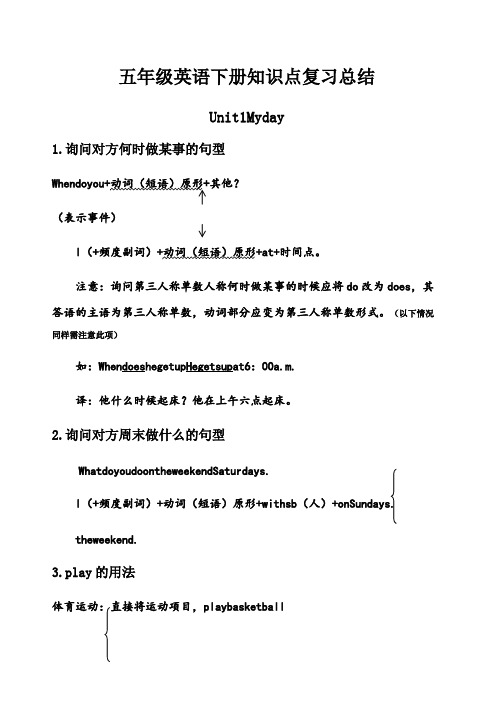
五年级英语下册知识点复习总结
Unit1Myday
1.询问对方何时做某事的句型
Whendoyou+动词(短语)原形+其他? (表示事件)
I(+频度副词)+动词(短语)原形+at+时间点。 注意:询问第三人称单数人称何时做某事的时候应将 do 改为 does,其 答语的主语为第三人称单数,动词部分应变为第三人称单数形式。(以下情况
同样需注意此项)
如:WhendoeshegetupHegetsupat6:00a.m. 译:他什么时候起床?他在上午六点起床。
2.询问对方周末做什么的句型
WhatdoyoudoontheweekendSaturdays. I(+频度副词)+动词(短语)原形+withsb(人)+onSundays. theweekend.
(2)在基数词后加 th:除去 first,second,third,其他基数词变序数词一般 直接在其后加 th。注意 five 与 twelve 要先把 ve 变 f,再加 th;eight 直接加 h;nine 去 e 再加 th。
(3)整十序数词以 ieth 结尾:整十位的序数词先将十位整数词尾的 y 变为 i, 再加 eth。如:twenty-twentieth。
The
注意:play-plays 因为 a 是元音 3)以 ch,sh,s,x 或 o 结尾的动词,在后面加-es; 例如 teach-teacheswash-washesdo-doesgo-goesfix-fixes
4)不规则的; 例如 have-has
5.by 的用法
(完整版)五年级下册英语复习资料

(完整版)五年级下册英语复习资料五年级下册英语复资料 (完整版)Unit 1: My Family and Friends- Vocabulary: learn new words related to family and friends, ___, father, brother, sister, friend, etc.- Grammar: practice using possessive adjectives (my, your, his, her, our, their) to ___.Unit 2: My School Life- Vocabulary: learn words associated with school, such as classroom, teacher, student, homework, etc.- Grammar: revise ___.Unit 3: My Hobbies and Interests- Vocabulary: ___ interests, e.g., read, swim, play football, draw, etc.- Grammar: learn how to use verbs with -ing form to express hobbies and interests.Unit 4: Food and Drinks- Vocabulary: learn names of different food items and beverages, such as rice, noodles, soup, milk, juice, etc.- Grammar: practice ___.Unit 5: Places in the City- Vocabulary: discover names of us ns in a city, like park, hospital, library, supermarket, etc.- Grammar: revise ns (in, on, at) and use them to ___.Unit 6: Sports and Activities- Vocabulary: ___ related to sports and activities, e.g., basketball, tennis, swimming, dancing, etc.- Grammar: learn how to form ns using "do" and "does" to talk about sports and activities.Unit 7: Travelling Around- Vocabulary: learn words associated with traveling, such as plane, train, bus, car, ticket, etc.Unit 8: ___- Vocabulary: ___, such as New Year, Christmas, birthday, party, etc.- Grammar: learn how to use simple present ___.Unit 9: My Daily Routine- Vocabulary: revise words related to daily routine, e.g., wake up, brush my teeth, have breakfast, go to bed, etc.- Grammar: practice using adverbs of frequency (always, usually, sometimes, seldom, never) to describe daily habits.Unit 10: Nature and Environment- Vocabulary: ___, such as sun, moon, stars, sky, forest, etc.- Grammar: ___.以上是五年级下册英语复资料的完整版。
统编-部编人教小学五年级下册英语:英语各单元总复习资料
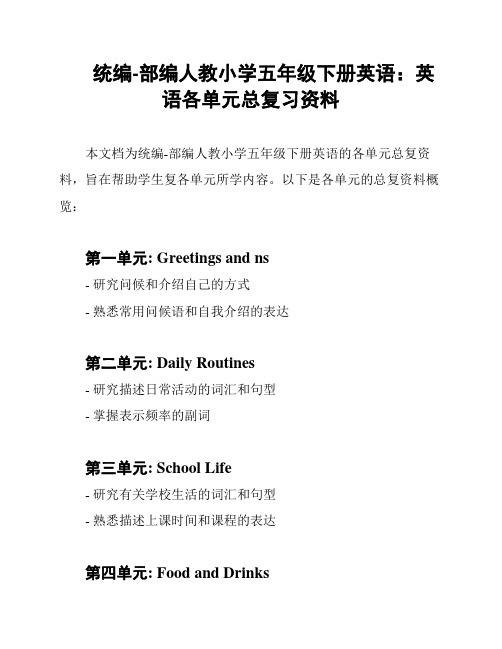
统编-部编人教小学五年级下册英语:英
语各单元总复习资料
本文档为统编-部编人教小学五年级下册英语的各单元总复资料,旨在帮助学生复各单元所学内容。
以下是各单元的总复资料概览:
第一单元: Greetings and ns
- 研究问候和介绍自己的方式
- 熟悉常用问候语和自我介绍的表达
第二单元: Daily Routines
- 研究描述日常活动的词汇和句型
- 掌握表示频率的副词
第三单元: School Life
- 研究有关学校生活的词汇和句型
- 熟悉描述上课时间和课程的表达
第四单元: Food and Drinks
- 研究食物和饮料的名称
- 掌握描述喜好和口味的表达
第五单元: Hobbies
- 研究描述爱好和兴趣的词汇和句型- 熟悉询问与回答他人爱好的方式
第六单元: Animals
- 研究动物的名称和特征
- 掌握询问和回答关于动物的问题
第七单元: Weather
- 研究常见天气条件和季节的表达- 熟悉描述天气状况和穿着的方式
第八单元: Festivals
- 研究各种节日的名称和庆祝方式- 掌握用英语谈论节日的能力
第九单元: Transport
- 研究交通工具的名称和用途
- 熟悉描述出行方式和时间的表达
第十单元: ___
- 研究国家名称和国籍的表达
- 掌握用英语谈论自己和他人的国籍
以上是统编-部编人教小学五年级下册英语各单元的总复习资料概览。
希望本资料能够帮助学生复习巩固所学知识,提高英语能力。
祝学习愉快!。
五年级英语下册期末复习重点
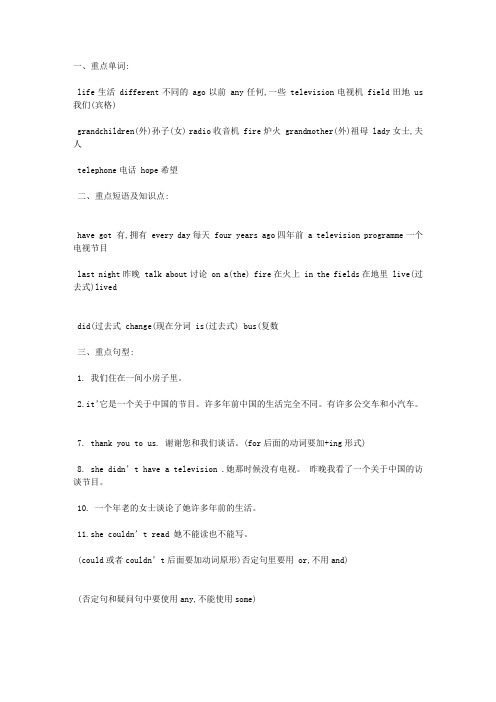
一、重点单词:life生活 different不同的 ago以前 any任何,一些 television电视机 field田地 us 我们(宾格)grandchildren(外)孙子(女) radio收音机 fire炉火 grandmother(外)祖母 lady女士,夫人telephone电话 hope希望二、重点短语及知识点:have got 有,拥有 every day每天 four years ago四年前 a television programme一个电视节目last night昨晚 talk about讨论 on a(the) fire在火上 in the fields在地里 live(过去式)liveddid(过去式 change(现在分词 is(过去式) bus(复数三、重点句型:1. 我们住在一间小房子里。
2.it’它是一个关于中国的节目。
许多年前中国的生活完全不同。
有许多公交车和小汽车。
7. thank you to us. 谢谢您和我们谈话。
(for后面的动词要加+ing形式)8. she didn’t have a television .她那时候没有电视。
昨晚我看了一个关于中国的访谈节目。
10. 一个年老的女士谈论了她许多年前的生活。
11.she couldn’t read 她不能读也不能写。
(could或者couldn’t后面要加动词原形)否定句里要用 or,不用and)(否定句和疑问句中要使用any,不能使用some)qiu jiagou.我在邱家沟。
(情景连线)第二模块一、重点单词:learnt(learn的过去式)学习 these这些 dancer舞蹈演员 class班级 study学习 hard 努力的retired退休的二、重点短语及知识点:dance( learn(过去式 learn(现在分词 make(过去式 teach(过去式) study(过去式 -go(三单 dance(名词)三、重点句型:因为她是个舞蹈演员。
五下英语复习资料

五下英语复习资料
五年级学习英语已经成为我们生活中不可或缺的一部分,因此
我们需要不断巩固自己的英语知识,逐步提高自己的英语水平。
以下是五下英语学习的一些复习资料,希望对大家的学习有所帮助。
一、单元词汇
五年级共有8个单元,每个单元都有一些重要的单词需要掌握。
在平时的学习中,我们可以结合图画、音频等方式进行记忆,同
时也需要加强口头练习,提高自己的语感。
二、短语和句型
单词的学习不可少,但短语和句型的掌握同样重要。
短语是我
们口语表达中一种比单个词更加便利的工具,而句型则能够让我
们更好地表达自己的意思。
三、阅读理解
阅读理解内容丰富,难度适中,对于提高学生的阅读水平大有
帮助。
这里我们需要多读多练,注重理解和记忆,同时加强口语
练习,提高口语水平。
四、听力与口语
在学习英语时,听力和口语是我们最需要重视的两个方面。
听
力和口语练习需要我们投入大量的时间和精力,要不断增加听力
和口语的输入和输出量,掌握一定的表达能力,尤其是借助大量
英语口语实例,对提高口语表达能力有着巨大的帮助。
五、写作
写作是我们提高英语能力的一个重要环节,可以锻炼我们的语言、思维和文化素养,提高我们的表达能力和文化素质,同时也
是提高我们语言能力的一种方法。
以上是五下英语复习资料,虽然学习英语需要的时间和精力较大,但是只要坚持下去,制定合适的学习计划,不断学习和实践,就一定能够取得不错的进步。
在这里,提醒大家不要忘记多交流,
并尝试和母语为英语的人群交流,这对于提高自己的口语和思维能力会很有帮助。
人教版五年级英语下册期末复习资料

人教版五年级英语下册期末复习资料一、词汇部分1. 词义辨析:根据给出的句子,选择相应的词语填空。
例:I am feeling ____(happy, serious) today.2. 词组搭配:根据所给的句子,选择合适的词组填空。
例:We ____(take, make) a bus to school every day.3. 同义词替换:将句子中的划线部分用合适的同义词替换。
例:My father is a doctor. He works in a hospital. --> My father is a doctor. He works in a _______.4. 反义词寻找:找出每组单词中与其他单词意思相反的一个。
例:big - small, tall, thin5. 词形转换:将括号中的词转换为合适的词形。
例:I am a _______(child) of my parents.二、语法部分1. 选择正确的单词:从括号中选择适当的单词填入句子中。
例:I _________ (am, is) going to the park this afternoon.2. 翻译句子:根据给出的句子,将其翻译成英语。
例:她正在看电视。
3. 句型转换:按要求转换下列句型。
例:He is a teacher. (改为一般疑问句)4. 选择正确的疑问词:选择正确的疑问词填入句子中。
例:________ do you go to school? (When/Where/What)5. 完成对话:根据对话内容,选择正确的句子完成对话。
例:A: _______ do you like to do in your free time?B: I like ________ (read/reads/reading) books.三、阅读部分1. 短文理解:阅读短文,选择正确的答案。
例:Tom _________ (has/ have) a sister.2. 阅读填空:根据短文内容,在横线上填入合适的词。
五年级英语下册复习知识点总结
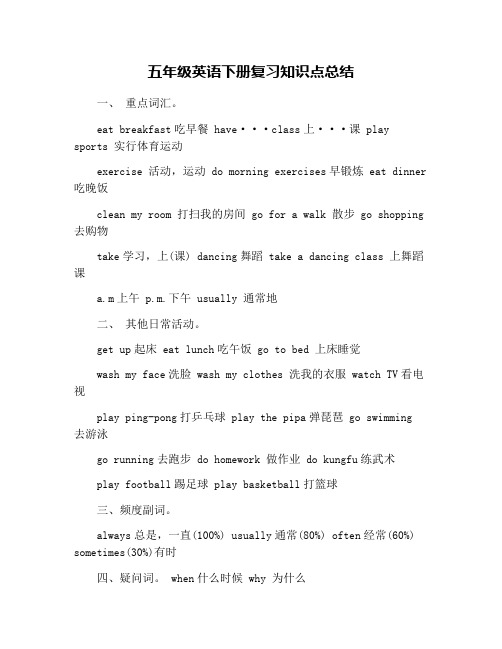
五年级英语下册复习知识点总结一、重点词汇。
eat breakfast吃早餐have···class上···课 play sports 实行体育运动exercise 活动,运动 do morning exercises早锻炼 eat dinner 吃晚饭clean my room 打扫我的房间 go for a walk 散步 go shopping 去购物take学习,上(课) dancing舞蹈 take a dancing class 上舞蹈课a.m上午 p.m.下午 usually 通常地二、其他日常活动。
get up起床 eat lunch吃午饭 go to bed 上床睡觉wash my face洗脸 wash my clothes 洗我的衣服 watch TV看电视play ping-pong打乒乓球 play the pipa弹琵琶 go swimming 去游泳go running去跑步 do homework 做作业 do kungfu练武术play football踢足球 play basketball打篮球三、频度副词。
always总是,一直(100%) usually通常(80%) often经常(60%) sometimes(30%)有时四、疑问词。
when什么时候 why 为什么五、重点句型。
1、询问别人什么时候做某事的句型及回答。
句型结构:问:When do you+动词短语原形+其他?(你/你们什么时候做某事?)答:I/we(+频度副词)+动词短语原形+at+具体时间(我/我们通常在几点做某事。
)例:问:When doyou go to bed?(你什么时候上床睡觉?)答:I go tobed at 9:00p.m (我晚上9点上床睡觉。
)注意:当主语是第三人称单数(he,she,it,单个人名或单数名词)时,助动词do要变成does,句型结构是:when does+主语(第三人称单数)+动词短语原形+其他?2、询问别人周末做什么的句型及回答。
五年级下册英语1到4单元知识点

五年级下册英语1到4单元知识点Unit 1: Holidays and festivals1. Vocabulary:- Holiday: A day when people do not go to work or school because of a special occasion.- Festival: A special time or event when people gather to celebrate something.- Celebrate: To do something special or enjoyable because of a special occasion.- Parade: A public celebration where people walk or drive along a route.- Costume: Special clothes that people wear for a party or festival.2. Grammar:- Present Simple Tense: Used to talk about habits, routines, facts, and general truths.- Adverbs of frequency: (Always, usually, often, sometimes, rarely, never) Used to show how often something happens.- Wh-questions: Questions that start with words like who, what, where, when, why, and how.3. Skills:- Reading: Understand different types of holidays and festivals around the world (e.g., Christmas, Thanksgiving, Chinese New Year).- Listening: Listen to conversations about holiday plans, traditions, and activities.- Speaking: Talk about favorite holidays and festivals and discuss how they are celebrated.- Writing: Write sentences and short paragraphs about holiday customs and traditions.Unit 2: Travelling1. Vocabulary:- Trip: A journey to a place and back again.- Journey: The act of traveling from one place to another.- Route: A way or course taken in getting from a starting point to a destination.- Vehicle: A machine that transports people or goods.- Sightseeing: To visit places of interest in a city or region.2. Grammar:- Present Continuous Tense: Used to talk about actions happening at the moment of speaking.- Imperatives: Commands or orders used to give instructions.- Prepositions of place: (In, on, at, by) Used to show the position or location of something.3. Skills:- Reading: Understand different types of transportation and travel destinations.- Listening: Listen to dialogues about booking tickets, planning trips, and giving directions.- Speaking: Describe travel experiences, ask for information, and give advice about traveling.- Writing: Write emails or postcards describing a recent trip, including details about accommodation, transportation, and sightseeing.Unit 3: Weather and seasons1. Vocabulary:- Weather: The condition of the atmosphere at a particular place and time.- Season: One of the four periods of the year (spring, summer, autumn, winter).- Temperature: How hot or cold the air is.- Forecast: A prediction of the weather in the future.- Sunny, cloudy, rainy, snowy: Different types of weather conditions.2. Grammar:- Present Continuous Tense: Used to talk about temporary actions happening now.- Comparative adjectives: (Bigger, smaller, hotter, colder) Used to compare two things.- Superlative adjectives: (The biggest, the smallest, the hottest, the coldest) Used to compare three or more things.3. Skills:- Reading: Understand the characteristics of each season and how they affect the weather.- Listening: Listen to weather forecasts, descriptions of seasons, and discussions about dressing for the weather.- Speaking: Talk about favorite seasons, describe typical weather in different seasons, and discuss clothing choices for different weather conditions.- Writing: Write short essays about favorite seasons, create weather forecasts, and describe seasonal activities and events.Unit 4: Animals and habitats1. Vocabulary:- Habitat: The natural home or environment of an animal, plant, or other organism.- Endangered: Threatened with extinction or destruction.- Species: A group of living organisms capable of interbreeding.- Predators: Animals that hunt and kill other animals for food.- Herbivores, carnivores, omnivores: Different types of animals based on their diet.2. Grammar:- Present Simple Tense: Used to talk about habits, routines, facts, and general truths.- Countable and uncountable nouns: Countable nouns can be counted (e.g., animals, trees), while uncountable nouns cannot be counted (e.g., water, air).- How much/many: Used to ask about the quantity of something (how much for uncountable nouns, how many for countable nouns).3. Skills:- Reading: Understand different types of animals and their habitats, including endangered species.- Listening: Listen to descriptions of animals, their behaviors, and their relationships with other animals.- Speaking: Talk about favorite animals, habitats, animal conservation, and animal-related activities.- Writing: Write reports about endangered animals, create posters about animal habitats, and describe animal behaviors and characteristics.。
小学英语五年级下册(牛津译林版)unit5 复习资料
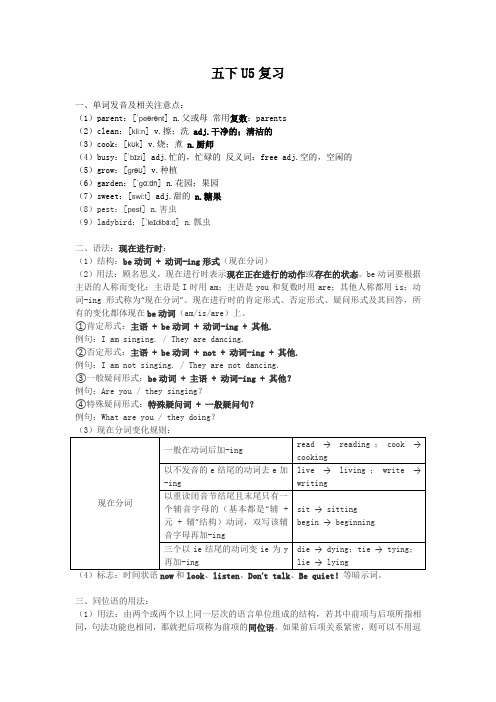
五下U5复习一、单词发音及相关注意点:(1)parent:[ˈpeərənt] n.父或母常用复数:parents(2)clean:[kli:n] v.擦;洗adj.干净的;清洁的(3)cook:[kʊk] v.烧;煮n.厨师(4)busy:[ˈbɪzi] adj.忙的,忙碌的反义词:free adj.空的,空闲的(5)grow:[grəʊ] v.种植(6)garden:[ˈgɑ:dn] n.花园;果园(7)sweet:[swi:t] adj.甜的n.糖果(8)pest:[pest] n.害虫(9)ladybird:[ˈleɪdibɜ:d] n.瓢虫三、同位语的用法:(1)用法:由两个或两个以上同一层次的语言单位组成的结构,若其中前项与后项所指相同,句法功能也相同,那就把后项称为前项的同位语。
如果前后项关系紧密,则可以不用逗号隔开;如果后项只是作前项的补充解释,则需用逗号隔开。
例句:Mr. Smith,our English teacher,is from England.He tells me his brother John is a doctor.四、busy的用法:(1)用法:busy是形容词,意为“忙的,忙碌的”;它的反义词是free,意为“空的,空闲的”。
busy常用于两个短语:be busy with sth和be busy (in) doing sth。
一般前面短语with后加名词,后面短语后加动词-ding形式。
例句:He is busy with his homework.He is busy doing his homework.五、like to do的用法:(1)结构:like + to do+ 其他.(2)用法:like to do意为“希望、想或愿意做某事”,指喜欢做特定的、某一具体的行动或一时的爱好。
例句:I like to play basketball toady.(3)拓展:like to do和like doing都可以表达“喜欢做某事”,但是用法稍有区别。
完整word版)重大版小学英语五年级下册复习资料

完整word版)重大版小学英语五年级下册复习资料Clean the room。
wash the socks。
make the bed。
do the dishes。
cook the dinner。
water the plants。
put away the clothes。
take out the rubbish。
These are all important tasks that we can doto help our parents at home。
We should do them often。
not just sometimes.When someone asks us if we help our parents at home。
we can answer with "Yes。
I do" or "No。
I don't"。
We can also ask others what they do at home。
For example。
"What do you do at home?".It's important to know what we can do for our parents。
For example。
we can cook the dinner or water the plants。
We canalso ask if Max often helps his parents and answer with "Yes。
he does" or "No。
he doesn't".In Unit 2.we learn different activities we can do at home。
We can read a book。
watch TV。
see a film。
外研版英语三年级起点五年级下册复习知识点总结

五年级下册M1-10复习资料一、四大时态。
1、一般现在时:表示通常性、规律性、习惯性、事实性的动作或状态。
就是说:过去,现在,将来都是这样。
时间标志词:every2、正在进行时:正在进行的动作。
时间标志词:now●主语+be动词+V-ing: China is changing.中国正在发生变化。
3、一般将来时:描述将要发生的事情①、主语+will+ V原:(1) Will you help me? 你会帮我吗?(2)I’ll be home at seven o’clock.我将会在7点回家。
②、主语+be going to +V原:(1)What are you going to take? 你将要带什么?(2) We are going to see you in three weeks. 我们将在三周后见到你。
(3)He is going to ask you some questions.他将要问你一些问题。
4、一般过去时:描述过去发生的事情●主语+V-ed (或特殊变化形式),助动词did,be动词:was, were●时间标志词:yesterday昨天,last week上周, last year去年, last month上个月, fiveyears ago五年前, three days ago三天前…..●例句:(1)Lingling went to Xinjiang last July.玲玲去年七月去了新疆。
动词过去式特殊变化以前学的:五年级下册:different interviewer change night work programme. field radio telephone couldn’t=could not write night.or there is there are there was there were.in the UK many years ago enough food lots of food talk to us .jump really far last night watch a telephone programme talk about .in the fields cook on a fire miss my grandma.二、句子1、China is changing.(现在进行时).2、We lived in a small house.(过去时).3、We live in a big house.(一般现在时).4、There weren’t many buses.().5、There are lots of buses and cars. ()6、She di dn’t have a television.write-wrote study-studied learn-learnt teach-taught language . dancer foreign hard grandparents driver pupil. 科目: Maths Science Art Chinese English PE Music . learn to dance learn to cook learn English teach languages write a book . Chinese cities foreign languages study very hard see the wind.二、句子1、She learnt English.( ).2、He’s learning English now. ( ).3、She taught languages. ( ).4、Mr. Li was a teacher. ( ).5、Now Mr. Li doesn’t work. ( ).6、She danced in lots of Chinese cites. ( )breakfast lunch dinner hamburger sandwich fish and chips . traditional dish very much give-gave tonight delicious . English food have a sandwich.二、句子1、What did she have for breakfast? ( ).2、She had eggs and sausages. ( ).3、Sam ate four hamburgers. ( ).4、I’ve got an email from Lingling. ( ).5、Yesterday she had an English breakfast. ( ).6、It’s a traditional English dish. ( ).7、She gave her hamburgers to Sam. ( ).8、Tonight Mum is going to cook Chinese food for us. ( )library idea shelf dictionary heavy card ask wrong . film dear way on student send-sent put information .as well topic make a home library good idea books about science . on this shelf here you are on Shelf C in the wrong place.二、句子1、Let’s make a home library..2、These are all books about science..3、We can find information from books and CDs..4、Now we can ask them to come..5、We are going to do a science project about animals..6、There are lots of different ways to find information on this topic..light heavy broken umbrella hard easy take lovely . too try pocket sales assistant wheel at the department store .二、句子1、This black bag is nice..2、 It’s big and light..3、It’s too big for you..4、It’s hard to fly a kite..5、Have you got a small one, please?.6、You can’t take it to China..7、And it’s got two pockets..8、It’s easy for you to carry..9、Try this white one.moon get parent west east north south stay July . June remember best have a rest ride-rode go to the moon. get there use my computer in the west of China last year.go with your parents stay with your parents every year.二、句子1、I went there last year..2、Did you go with your parents?.3、She visited the Tianchi Lake..4、Where did you go for the holidays?.5、How did you get there?.6、They are photos of me and my family in China..evening late early factory taxi worry to quarter. 职业: worker policeman nurse taxi driver get up go to bed .二、句子表示时间:①数字+o’clock ……点整②half past +数字……点半③a quarter past +数字……点过15分④a quarter to+数字差15分到……点1、My father goes to work at eight o’clock every morning..2、I’ll take you there at half past seven..3、What does he do? He’s a worker in a factory..4、It’s a quarter to eight now..5、What time will you be home?.6、I’ll be home at seven o’clock..word draw-drew put-put paper cut-cut piece paint-painted . stick tie-tied string paper fish great present make a kite .二、句子1、Will you help me? Of course I will..2、I made a kite..3、I’ll make a kite..4、I’m going to visit my cousin in New York..5、What present can I take?.6、What about a toy panda?.7、You can write the Chinese word for “dragon” on it..8、做风筝步骤:①、I drew a dragon on a piece of yellow paper.②、Ipainted it.③、I cut the paper.④、I put sticks on it.⑤、I tied strings to it.⑥、Then I could fly my kite.wear-wore woman-women tell-told after read ask bring . laugh letter theatre actor restaurant ready read-read another . bring history wear a coat tell a joke after the show not……at all . ask some questions children’s theatre in three weeks buy-bought .二、句子1、I’ve got two letters in English..2、Mum bought new T-shirts for you..3、The men wore women’s clothes..4、The actors told lots of jokes..5、Are you ready for your trip to the US?.6、We are going to see you in three weeks..7、Don’t forget to bring some CDs of Chinese songs..when speak end nervous all right airport ticket passport . safe pet building American find out more make a list. things to do have a safe trip at the airport take a taxi to…… I don’t know. .二、句子特殊疑问词:when什么时候;what什么;where哪里;who谁;how怎样1、Where are you going? I’m going to the airport..2、What are you going to take?.3、When are you going to the airport?.4、Who’s going to the airport with you?.5、I arrived here yesterday..6、I think so. But I feel nervous..7、It will be all right..。
人教版小学五年级下册英语知识点复习
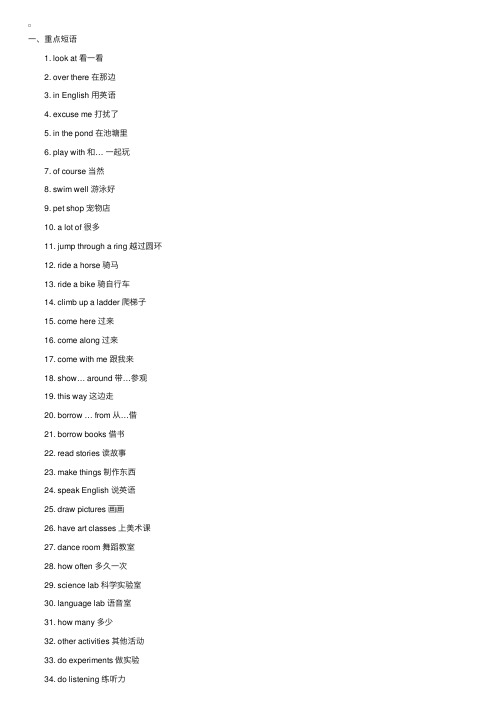
⼀、重点短语 1. look at 看⼀看 2. over there 在那边 3. in English ⽤英语 4. excuse me 打扰了 5. in the pond 在池塘⾥ 6. play with 和… ⼀起玩 7. of course 当然 8. swim well 游泳好 9. pet shop 宠物店 10. a lot of 很多 11. jump through a ring 越过圆环 12. ride a horse 骑马 13. ride a bike 骑⾃⾏车 14. climb up a ladder 爬梯⼦ 15. come here 过来 16. come along 过来 17. come with me 跟我来 18. show… around 带…参观 19. this way 这边⾛ 20. borrow … from 从…借 21. borrow books 借书 22. read stories 读故事 23. make things 制作东西 24. speak English 说英语 25. draw pictures 画画 26. have art classes 上美术课 27. dance room 舞蹈教室 28. how often 多久⼀次 29. science lab 科学实验室 30. language lab 语⾳室 31. how many 多少 32. other activities 其他活动 33. do experiments 做实验 34. do listening 练听⼒ 35. observe things 观察事物 36. do speaking 练⼝语 37. New Year’s Day 元旦 38. meeting hall 会议⼤厅 39. Children’s Day ⼉童节 40. be good at 擅长 41. be interested in 对…感兴趣 42. music club ⾳乐俱乐部 43. no one 没有⼈ 44.play the violin 拉⼩提琴 45. art club 美术俱乐部 46. come into 进⼊ 47.listen to music 听⾳乐 48. cut out 剪下 49. come from 来⾃ 50. up and down 上上下下 51. in groups 成组 52. science corner 科学⾓ 53. group work ⼩组活动 54. do project work 做项⽬制作 55. art corner 美术⾓ 56. computer corner 电脑⾓ 57.play football 踢⾜球 58. be famous for 因…闻名 59. study plants and animals 研究动植物 60. do exercises 做运动 61. on the field 在操场上 62. do printing on the paper 在纸上印刷 63. how about …怎么样? 64.go on field trips ⽥野考察 65. play volleyball 打排球 66. play basketball 打篮球 67. play hockey 打曲棍球 68. play rugby 打橄榄球 69. in the forest 在森林⾥ 70. have a look at 看⼀看 71. here you are 给你 72. how much 多少(钱) 73. a pair of ⼀双;⼀对 74. try on 试穿 75. shoe shop 鞋店 76. clothes shop 服装店 77. make a shopping list 做购物单 78. sports shop 体育⽤品商店 79. cake shop 蛋糕店 80. pay for 付钱 81. feel well 感觉好 82. see a doctor 看医⽣ 83. take good care of 好好照顾 84. have a bad cold 得了重感冒 85. have a fever 发烧 86. have a stomachache 胃疼 87. have a headache 头疼 88. have a toothache ⽛疼 89. have a cough 咳嗽 90. go to a concert 听⾳乐会 91. do maths problems 做数学题 92. go to the music club 去⾳乐俱乐部 93. have to 不得不 94. stay in bed 待在床上 95. get well 康复 96. be worried about 担⼼ 97. don’t worry 别担⼼ 98.help … with 帮助…做某事 99. in the hospital 在医院⾥ ⼆、重点短语讲解 1. play with 和…⼀起玩 play with sb.(某⼈) 和…⼀起玩 play with sth.(某物) 玩某物 e.g. Lucy and Lily are playing with their mother. Lucy and Lily are playing with their doll. 2. a lot of 很多 a lot of = lots of + 可数名词复数或不可数名词 e.g. 同义句转换 There are a lot of apples on the table. = There are ______ ______ apples on the table. (答案:lots of) 3. how often 多久⼀次 how often 是⼀个特殊疑问词,就频率提问。
- 1、下载文档前请自行甄别文档内容的完整性,平台不提供额外的编辑、内容补充、找答案等附加服务。
- 2、"仅部分预览"的文档,不可在线预览部分如存在完整性等问题,可反馈申请退款(可完整预览的文档不适用该条件!)。
- 3、如文档侵犯您的权益,请联系客服反馈,我们会尽快为您处理(人工客服工作时间:9:00-18:30)。
五年级下册英语复习资料Unit one: my day单词:eat breakfast 吃早餐have…class 上……课play sports 进行体育运动exercise 活动、运动do morning exercises 做早操eat dinner 吃晚饭clean my room 打扫我的房间go for a walk 散步go shopping 去购物take…class 学习、去上课dancing 跳舞take a dancing class 上舞蹈课when 什么时候after在(时间)后start开始usually 通常地Spain 西班牙late晚、迟a.m. 午前、上午p.m. 午后、下午why 为什么shop 购物work 工作last上一个的also 还、也sound 听起来好像busy 忙的need需要letter 信play 剧本、戏剧live 居住island 岛always 总是、一直cave 山洞、洞穴win 获胜go swimming 去游泳hard-working 勤奋的短语:finish class 放学go back to… 回到…… after lunch 午饭后sound like 听起来像a letter for 一封来自……的信on an island 在一个岛屿上clean my cave 打扫我的洞穴be good at 擅长于get off 下车、离开what else 其它的什么?句型:1、-When do you get up? 你什么时候起床?2、I always start class at 8 o’clock. 我总是在八点上课。
3、-When do you go back to school after lunch?你午饭后什么时候回学校?-At 2:30.两点半4、What do you do on the weekend?你在周末干什么?-I often clean my room.我经常打扫我的房间。
5、That’s too late.那太晚了。
6、Sometimes I play ping-pong with Zhang Peng. 有时我和张鹏打乒乓球。
7、I always go shopping with my mum. 我总是和我妈妈去购物。
8、Why are you shopping today? 你今天为什么来购物?9、That sounds like a lot of fun.那听起来非常有趣。
Unit two: my favorite season单词:spring 春天summer 夏天autumn 秋天winter 冬天season 季节picnic野餐snowman雪人go on a picnic去野餐pick摘、采集pick apple摘苹果make a snowman 堆雪人go swimming去游泳which 哪一个best最好leaf 叶子snow 雪good job 做得好because 因为vacation 假期all 全、完全pink 粉色、粉色的lovely 可爱的fall 落下、秋天paint 用颜料绘画短语:four seasons 四个季节draw the seasons 画出季节summer vacation 暑假pretty flowers 漂亮的花play in the snow在雪中玩耍like…best… 最喜欢……paint a picture画一张画lots of 许多merry Christmas圣诞快乐!go to the beach去沙滩句型:1、-Which season do you like best?你最喜欢哪个季节?-Summer. I can go swimming every day.夏天。
我可以每天去游戏。
2、Spring is green with flowers and songs.春天绿意盎然,鲜花盛开,歌声四溢。
3、Autumn is golden and farmers are busy. 秋天是金色的,农民们很繁忙。
4、Winter is white and the year is gone.白色的冬天预兆着这一年即将结束。
5、Why do you like summer?你为什么喜欢夏天?-Because I like summer vacation.因为我喜欢暑假。
6、I like spring best, there are beautiful flowers everywhere. I often go on a picnic with my family.我最喜欢春天,到处都是美丽的花,我常常和我的家人去野餐。
7、The leaves fall and fall. I love fall.叶子不断地落下来,我喜欢秋天。
8、-What do you usually do on Christmas Day?圣诞节你通常做什么?-I usually go to the beach and swim in the sea.我经常去海边,在大海里游泳。
9、Christmas is in summer in Australia , so we never have snow for Christmas.在澳大利亚,圣诞节正值夏天,所以我们从未见过下雪的圣诞节。
Unit three: my school calendar单词: January 一月February 二月march 三月April 四月may 五月June六月July 七月august八月September 九月October 十月November十一月December 十二月few不多很少a few 一些thing 事情meet 集会、开会sports meet 运动会Easter 复活节trip 旅行year 年plant 种植contest 比赛、竞赛the great wall 长城national 国家的national day 国庆日American 美国的thanksgiving day 感恩节Christmas 圣诞节holiday 假日、节日game 游戏roll 滚动look for 寻找chocolate 巧克力bunny 兔子(用作儿语)RSVP(尤用于请柬)请赐复by 在……之前短语:tree planting day 植树节winter vacation 寒假Easter party 复活节派对china’s national day 中国的国庆节singing contest 演唱会meet the Easter Bunny 见复活节兔子roll Easter eggs 滚复活节彩蛋mid-autumn day 中秋节 a few fun things 一些有趣的事情in September 在九月have a school trip 举行学校旅行send me an email 给我发邮件go to grape valley 去葡萄沟study hard 努力学习go to huangshan mountain 去黄山句型:1、-When is Tree Planting Day?植树节在什么时候?-It’s in march.在三月份。
2、What will you do for your mum on mother’s day? 母亲节你将为妈妈做什么?-I’ll make a card for her.我将为她做一张贺卡。
3、Children’s day is in June. 儿童节在六月。
4、I’ll cook for my mother. 我将做饭给妈妈吃。
5、We’ll go to the great wall. 我们将会去长城。
6、They live in Xinjiang. 他们住在新疆。
7、Sounds good! 听起来不错!Unit 4: when is Easter单词:first(1st)第一的second(2nd)第二的third(3rd)第三fourth(4th)第四fifth(5th)第五twelfth(12th)第十二twentieth(20th)第二十twenty-first(21st)第二十一twenty-second(22nd)第二十二twenty-third(23th)第二十三thirtieth(30th)第三十special 特殊的、特别的fool蠢人、傻瓜kitten 小猫diary 日记still 仍然、依旧、还是noise 声音、响声、噪音fur 软毛open 开着的walk 行走短语:on the second Sunday 在第二个星期日September 27th 9月27日on mid-autumn day 在中秋节on april 5th在4月5日april fool’s day 愚人节his eleventh birthday 他的十一岁生日cook noodles for her 给她做面条吃both of you 你们两个make noises 发出噪音have white fur 有白色的绒毛don’t worry 别担心after school 放学以后play with 和……说Chinese noodles 中式面条句型:1、-when is april fool’s day?什么时候是愚人节?-It’s on april 1st .在4月一日。
2、-When is the English test?什么时候英语考试?-It’s on November 2nd .在11月2号。
3、My birthday is on January 1st .我的生日在1月1日。
4、What do you usually do on mid-autumn day?中秋节你们通常做什么?5、The singing test will be on may 4th .歌唱测试将在5月4日。
6、Will you play football with me after lunch?午饭后你打算和我一起去踢球吗?7、I’ll go swimming tonight.今晚我将去游泳。
8、They still can’t see.他们仍然看不见。
9、They make noises when they are hungry. 它们饿的时候会发出噪音。
Unit 5:whose dog is it?单词:mine 我的yours 你(们)的his他的hers 她的theirs 他们的、她们的、它们的ours 我们的climbing (正在)攀登eating(正在)吃playing(正在)玩耍jumping(正在)跳drinking(正在)喝sleeping(正在)睡觉each每一、各个other 其他each other 相互excited 兴奋的、激动的like像…那样短语:whose dog 谁的狗play with 与……玩a picture of Beijing 一张北京的图片in the kitchen 在厨房drink water 喝水take him to the park 带他去公园come here来这dance like a bear像熊一样跳舞be quiet 安静eat like a rabbit 像兔子一样吃东西look at 看…take picture 拍照Mr. Zhang’s book 张先生的书句型:1、-Whose dog is this? 这是谁的狗?-It’s his.是他的。
